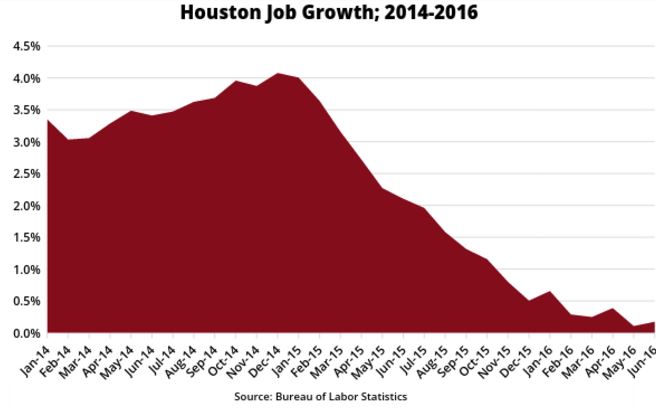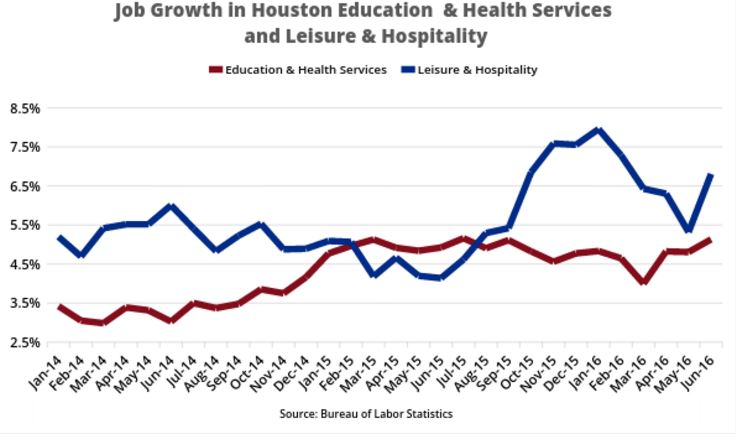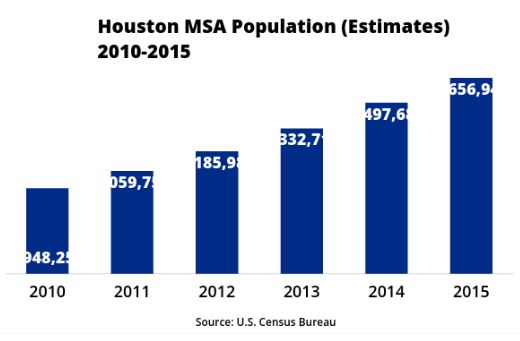Wednesday, August 17th, 2016 and is filed under Economy, Housing Market, Housing Starts

The economic news about Texas has been middling to okay. Economists with the Real Estate Center at Texas A&M University point out that, while job growth and GDP slowed in June, housing demand and sales continues improving1.
Then there is Houston.
The information out there has been portraying Houston as wallowing in an economic situation of unprecedented proportions. The drop in the price of oil has led to energy-sector job cuts. This, in turn, has led to less consumer spending. Retail has been impact, as store closures increase. Fewer jobs means a drop in housing demand. On top of all of this are the dark hints that the metro could be experiencing a return to the terrible days of the 1980s, during which the banks and real estate failed, and the economy crashed.
There is no doubt that the Houston-The Woodlands-Sugar Land Metropolitan Statistical Area (MSA) is experiencing some bad economic bumps in the road. But the region is nowhere near the 1980s apocalypse. There are, in fact, three reasons why why the Houston MSA is in little danger of an outright economic collapse.
#1: There Has Been Some Job Creation
No, the metro’s job growth isn’t at the heady 4% it enjoyed in late 2014-early 2015. And job growth has been bouncing along the bottom for several months, nowhere near the 4.0% or so enjoyed in the latter part of 2014 and early part of 2015.
But job growth is still, well, growth. It hasn’t gone negative. In other words, the metro is generating some jobs.
 According to the Bureau of Labor Statistics’ most recent report, the economy generated 5,500 jobs from May 2016-June 2016, beating out the 3,500 jobs added a year ago, at the same time2.. Granted, the number of jobs added is well below the 25-year average gain of 3,400 for the month of June. But once again, new jobs are being created.
According to the Bureau of Labor Statistics’ most recent report, the economy generated 5,500 jobs from May 2016-June 2016, beating out the 3,500 jobs added a year ago, at the same time2.. Granted, the number of jobs added is well below the 25-year average gain of 3,400 for the month of June. But once again, new jobs are being created.
#2: Not all Sectors Are Taking a Beating
Certainly “oil” might be the first thing that comes to mind when thinking about Houston. The metro is known as the “Energy Capital of the World” for good reason. But other sectors are thriving, and creating jobs.
Houston has three major industry players; energy, the Texas Medical Center, and the Houston Channel/Port of Houston. The Houston Ship Channel contributed close to 1.2 million jobs, not just to Houston, but throughout Texas. This represented an increase from the 1 million jobs reported in 20123.. Meanwhile, the Texas Medical Center remains a large employer as well. The Education & Health Services sector continues creating more employment opportunities, as does Leisure & Hospitality.


#3: The Population Continues Growing
People don’t want to live in a place where there are no jobs and no hope. That doesn’t seem to be happening within the Houston MSA. Population numbers have increased from 2010-2015.
 The latest Census numbers were from 2015, so it will be interesting to see how, or whether, the oil price decline impacts population in 2016. Still, a steady increase in population over a five-year period suggests that Houston offers attractions to an interested population.
The latest Census numbers were from 2015, so it will be interesting to see how, or whether, the oil price decline impacts population in 2016. Still, a steady increase in population over a five-year period suggests that Houston offers attractions to an interested population.
Not So Great . . . But Not So Bad, Either
None of the above suggests that Houston is any kind of economic juggernaut. Analysts indicate that the Houston metro will struggle through the oil scenario well into 2018. No. Many analysts point out that the Houston MSA could be struggling through 2018 until oil and energy prices rebound.
But Houston is in little danger of an outright 1980s collapse. Today’s Houston economy is more diversified, banks are better-leveraged, and real estate isn’t being overbuilt (with the exception of apartments). The reality of Houston is that job growth will remain sluggish, but at least it will be growth.
[1] Luis Torres and Wayne Day. (12 August, 2016) “Outlook for the Texas Economy.” Real Estate Center at Texas A&M University. Retrieved from https://www.recenter.tamu.edu/articles/technical-report/outlook-for-the-texas-economy.
[2] “Economy at a Glance: Houston-Sugar Land-Baytown, TX.” (2016, July). Retrieved from http://www.bls.gov/eag/eag.tx_houston_msa.htm
[3] “Economic Impact.” Port of Houston Authority. Retrieved from http://www.portofhouston.com/about-us/economic-impact/